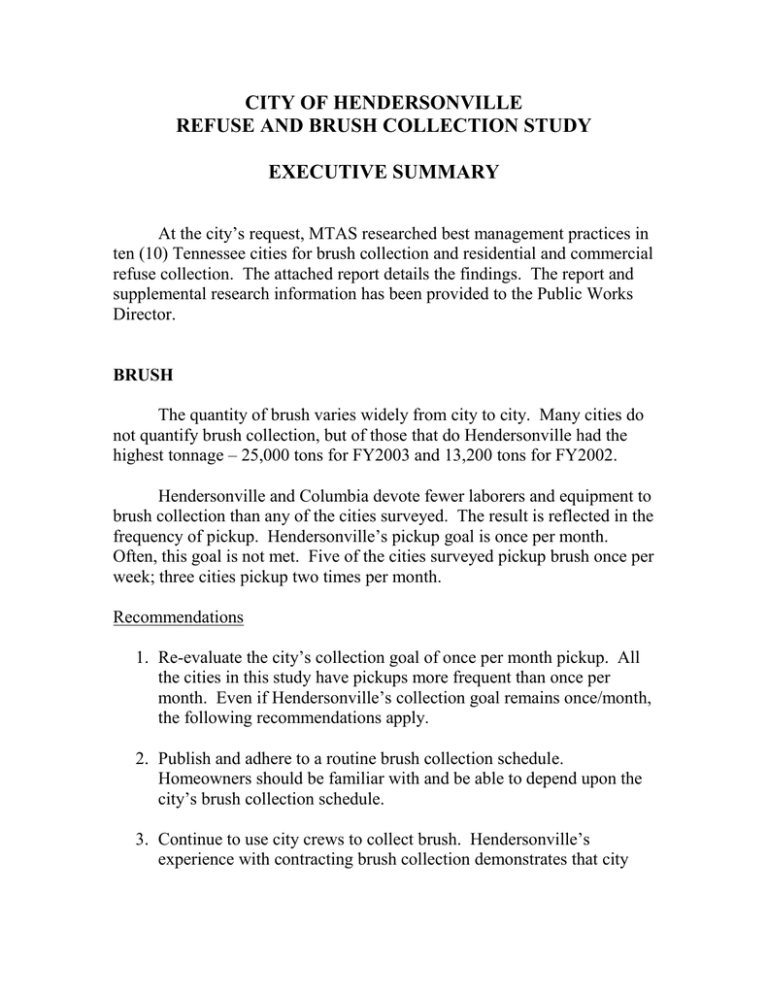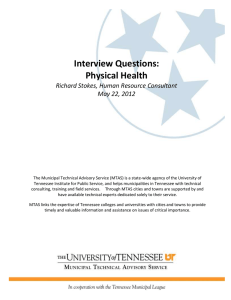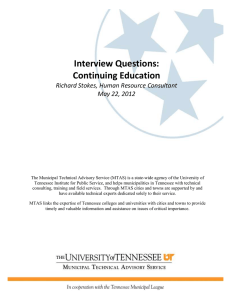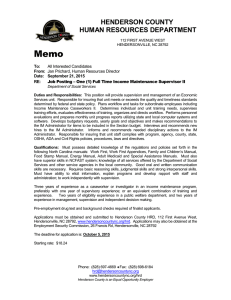CITY OF HENDERSONVILLE REFUSE AND BRUSH COLLECTION STUDY EXECUTIVE SUMMARY
advertisement

CITY OF HENDERSONVILLE REFUSE AND BRUSH COLLECTION STUDY EXECUTIVE SUMMARY At the city’s request, MTAS researched best management practices in ten (10) Tennessee cities for brush collection and residential and commercial refuse collection. The attached report details the findings. The report and supplemental research information has been provided to the Public Works Director. BRUSH The quantity of brush varies widely from city to city. Many cities do not quantify brush collection, but of those that do Hendersonville had the highest tonnage – 25,000 tons for FY2003 and 13,200 tons for FY2002. Hendersonville and Columbia devote fewer laborers and equipment to brush collection than any of the cities surveyed. The result is reflected in the frequency of pickup. Hendersonville’s pickup goal is once per month. Often, this goal is not met. Five of the cities surveyed pickup brush once per week; three cities pickup two times per month. Recommendations 1. Re-evaluate the city’s collection goal of once per month pickup. All the cities in this study have pickups more frequent than once per month. Even if Hendersonville’s collection goal remains once/month, the following recommendations apply. 2. Publish and adhere to a routine brush collection schedule. Homeowners should be familiar with and be able to depend upon the city’s brush collection schedule. 3. Continue to use city crews to collect brush. Hendersonville’s experience with contracting brush collection demonstrates that city crews are much less expensive than contractors. 4. Phase out the chipper and replace it with a knuckleboom/truck combination. Knucklebooms are the preferred collection equipment for brush piles. 5. In addition to replacing the chipper with a knuckleboom, add another knuckleboom/truck combination and crew. Inadequate equipment and manpower cause the city to fall behind on its goal of monthly collection. Currently Hendersonville has 2 knucklebooms. MTAS recommends 4. 6. Do not begin “new” brush/yard waste collection services such as a leaf vacuuming operation, especially as long as BFI collects bagged leaves. Vacuuming leaves costs considerably more than bagged collection because it is labor intensive. 7. Adopt, publish and aggressively enforce an ordinance to charge for excessive brush and yard waste. Notify homeowners and tree trimmers that the city will charge to collect brush left by tree trimming contractors. The fee should be high enough to encourage compliance. The Public Works Director estimates that it costs up $19/pile to collect brush. A fee in the range of $30/pile may be appropriate. COMMERCIAL COLLECTION Experience from the cities surveyed in this project (as well as MTAS’ experience with other cities) shows that once any solid waste service is begun, it is very difficult to discontinue. At this time, commercial customers in Hendersonville contract with private vendors for refuse collection. Why would the city consider adding service for commercial customers? MTAS understands that a primary reason relates to how solid waste collection and disposal services are funded. In Hendersonville, households pay an annual fee of ~$128. This fee does not cover costs. The balance is funded by the city’s general fund. Commercial customers also pay taxes to the city (and at a higher assessment rate than households), but receive no sanitation services. Thus there is an inequity in tax-funded services being 2 provided to businesses compared to services being provided to households. The equity issue could be neutralized if fees were set to cover sanitation services. Then general tax dollars would not subsidize garbage collection and disposal costs. Another reason relates to flow-control. Since Hendersonville and the other governments of Sumner County subsidize operations at the Sumner County Resource Authority, there is an incentive to keep the garbage generated in Sumner County flowing to and tipping at the Resource Authority. Currently, refuse collected from commercial customers in Hendersonville is likely being disposed of out of county since tipping fees at nearby landfills are less costly than the tipping fee at the Resource Authority. Recommendations 1. MTAS recommends funding refuse collection/disposal services via fees. If operations were fee funded, then the city and the customers would know the true costs of refuse services. Equity in service delivery would not be an issue, and sanitation service decisions could more easily be based on costs. However, MTAS recognizes that Hendersonville’s sanitation services are not currently set up to be financially self-sufficient, and that it may take some time to move from an operation funded by a mix of fees and general fund monies to one funded entirely from fees. 2. If Hendersonville decides to begin service to some commercial customers, MTAS recommends: Gather information about the number of probable commercial customers, locations, amounts of refuse, etc. Charge fees that cover all (or most) of the costs associated with collection and disposal. If collection and disposal services for commercial customers are subsidized from the general fund, the subsidy should be kept low. In order to determine collection costs, cost proposals from BFI or other vendors must be obtained. Then tipping fees and administrative overhead costs must be considered. Start with small commercial customers who do not use bulk containers. These commercial customers would use containers similar to those used by households. The number of total 3 containers and the frequency of collection should be similar to residential customers. Provide service to commercial customers only if (1) the existing contract with BFI can be amended to accommodate the commercial customers, or (2) a contract with a second private vendor can be secured. The city does not have crews to service commercial customers, and MTAS does not recommend that the city get into this business. The city should consider the impact of adding customers on the public works staff. This staff is already overburdened with the large number of sanitation complaints from residential customers. Adding commercial customers would almost certainly add extra work to the city’s staff. RESIDENTIAL COLLECTION Hendersonville is the only city of the ten surveyed that provides twice per week collection. Hendersonville is one of four cities that provide backdoor collection. Backdoor collection is a higher level of service and thus more expensive than curbside collection. All the cities with backdoor service reported higher levels of customer complaints than those cities with curbside service. In 1996, Bartlett switched from backdoor service to curbside service. They reported that customer complaints had been running over 200 per month prior to the switch, but dropped to under 200 per year almost immediately after the switch. Recommendations 1. Customer Fees - since the BFI contract has been extended, there are few immediate changes required in residential collection. However, MTAS recommends that the city consider changes in the way refuse collection services are funded. If the city accepts MTAS’ recommendation on financial self-sufficiency discussed under Commercial Collection above, customer fees should be set to cover costs of collection and disposal. The city could phase in financial self-sufficiency over the next couple of years. 4 2. Contract Management – with the history of a large number of sanitation complaints, MTAS recommends that the city assign a fulltime staff position to manage sanitation services. 3. Public Input - while phasing in fees to cover sanitation services, devote more attention to educating the public about the costs of various types of service. Tie service to costs, and seek public input before making changes. Consider using a citizen survey. 4. Plan Ahead - well before the current BFI contract expires, seek request for proposals (RFP) from vendors for various types of service. By seeking cost proposals for different levels of service, the city and its customers would have more information about the type of service they want to purchase and how much they are willing to pay. MTAS recommends that city staff also respond to the RFP to gage how city crews compare with contractors. An RFP could be structured to request costs for various options: a. Alternative A – backdoor service two times per week b. Alternative B – backdoor service one time per week c. Alternative C – curbside service one time per week, customer provides the containers d. Alternative D – curbside service one time per week, standardized carts (either city pays for the cart or customer pays for the cart), etc. 5. MTAS recommends that the city seriously consider curbside collection. Curbside collection costs are considerably less than backdoor collection, complaint levels are lower and more competition from vendors may be available. Backdoor service is highly susceptible to labor shortage. This causes the contractor to continuously train because of high turnover. A labor force unfamiliar with backdoor collection points in turn leads to more problems and customer complaints. MTAS recommends that the city evaluate sanitation services annually. Thank you for the opportunity to present this report. We enjoyed working with the Public Works Director on this project. 5


